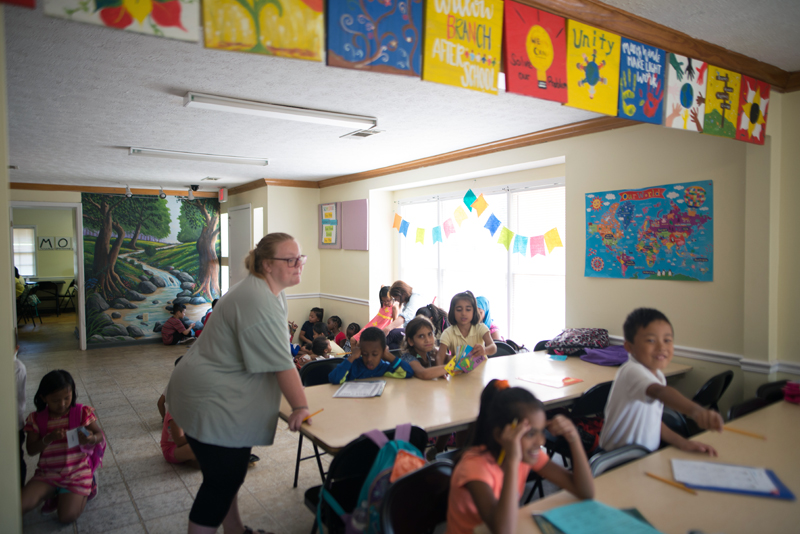
Photo by Ali Sardar
Allie Reeser oversees children in the after-school program at Willow Branch apartments.
CLARKSTON, Ga. — Children are making mud in the after-school program at Willow Branch apartments — and it’s not a carefully crafted science project.
They squat in an eroded area near the clubhouse stirring the dirt and gravel. Others run from the kitchen carrying water in their mouths, since Miss Allie would not let them carry water in their juice glasses.
In the midst of it all, Allie Reeser sits on the wide clubhouse steps, wearing her red glasses, loose pink T-shirt and green sneakers. The 26-year-old after-school director is a calm presence among the play.
“Stop bouncing the ball on the roof,” she calls out in an even voice. The children hear and obey.
“When you want to talk to me, say my name once and wait,” she tells another, who was clamoring for attention.
Reeser has a quiet equanimity, whether she’s helping a group of fourth-grade girls with homework or watching several dozen kids in free play.
It’s nearly the end of the afternoon. Reeser and her assistant Leela Basnet, 28, stand up and holler: “Time to go home!” They have to repeat it several times. Children say good-bye and head across the grass to their apartments. Older ones take the little ones by the hand. It’s an idyllic commute home in the late afternoon sunshine.
Reeser will head to her own apartment, a second-story unit with bicycles stored on the balcony.
She’s one of the few people in this complex of international refugees who was born in the United States.
Long involvement
Back in the 1990s, when she was a child, the city of Clarkston east of Atlanta began changing. A refugee community grew as resettlement agencies placed families there. Northlake Church of Christ, where her father was youth minister, took note.
“Our parents always taught us to help others and be active in the community,” she said. Her mother is an accountant — “the sweetest person you would ever meet,” she said.
“We really got involved in Clarkston when I was in high school,” she said. Reeser volunteered with kids at Willow Branch when she was a teenager.
In 2014 she graduated from Lipscomb College in Nashville, Tenn., where she studied theology and ministry with an emphasis on children’s ministry. Her two older brothers are similarly engaged. One is associate minister at a church in North Carolina. The other also lives at Willow Branch and, among other things, leads conflict resolution classes at local schools.
They are not proselytizers. “Our community is our ministry,” she said.
Her youngest brother, 15, is a refugee from Burma whom her parents adopted three years ago. He came to the United States with his grandmother but had a tough time settling in. He visited Reeser’s family one night and, in a sense, never left, she said.
While others might see struggle and difficulty at Willow Branch, Reeser sees joy.
“I like how open people are here,” she said. The residents are Muslim, Buddhist, Hindu, Christian or nonreligious, she said. You can be who you are.
Reeser may be looking for — and finding — the things she values.
“A lot of my friends who are refugees have the most joy I’ve seen. They’ve experienced the most darkness. They know joy in small things.
“This is my community,” she said.





























